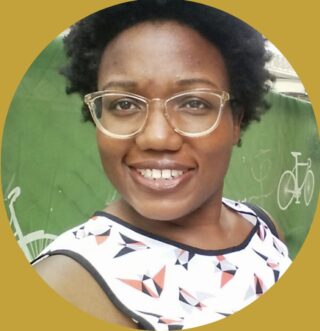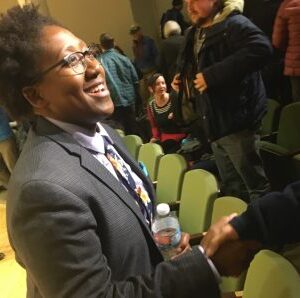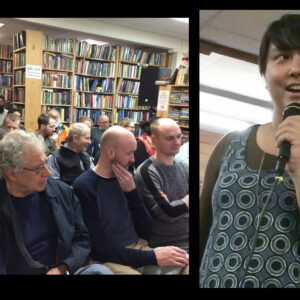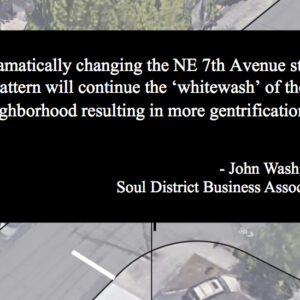
(From her website)
Courtney Williams wants cycling advocates to change on the inside before working to change what’s outside.
Williams, a bicycle advocacy consultant who lives in Brooklyn, New York and is also known as The Brown Bike Girl, wants more organizers and community leaders in the cycling space to think not just about bike lanes, but whether or not their own biases and privilege prevent people from influencing projects and policies that relate directly to the institutional and physical barriers they face while getting from place to place.
Williams will host, Outside Advocate: Anti-Bias, Anti-Privilege Seminar, on Saturday (1/25) at The Street Trust headquarters in northwest Portland.
While here, Williams said via email this week that she wants to, “Help the Greater Portland bike community begin to work through eliminating some of the repetitive racial faux pas and internal biases that have been a roadblock to unification of diverse communities over time.”
Advertisement
In fall 2018 Williams spoke on the topic of racial justice and equitable infrastructure planning at the North American Bike Share Association conference in Portland and sees Saturday’s event as a continuation of that conversation. According to Williams, “The impact of providing or withholding bike lanes and bike share stations [from certain people in certain neighborhoods] plays into either normalizing or criminalizing the sight of people of color on bikes — and therefore leads to disproportionate and unnecessary interactions with police that frequently lead to other long-term life complications.”
“Making people into one-dimensional characters for the sake of leverage is tokenism.”
— Courtney Williams
The idea of “freedom of movement for every set of neighbors and neighborhoods” is central to Williams’ approach and she wants to help organizations, “Make an institutional practice of examining all the factors that may enhance or impede that right.”
Asked via email this week for an example of a common mistake organizations make, Williams said tokenism is a big one. “Often times, organizations that seek to be more inclusive latch on to the idea that ‘representation matters’ (and it does) and begin to integrate images of target groups of color into their marketing,” she said. “They then congratulate themselves on their diversity work without having achieved any measurable outcomes.” Instead of making real changes, Williams sees tokenism as, “Making people into one-dimensional characters for the sake of leverage.” During her seminar she’ll lead a discussion about how to navigate the nuances of representation.
Williams is a member of the 2020 Filmed by Bike jury and connected with The Street Trust to add the seminar to her visit to Portland. Registration for Saturday’s class is closed, but you can email Williams at thebrownbikegirl@gmail.com to fill remaining spots and/or be on the cancellation list.
Learn more about the event here.
— Jonathan Maus: (503) 706-8804, @jonathan_maus on Twitter and jonathan@bikeportland.org
— Get our headlines delivered to your inbox.
— Support this independent community media outlet with a one-time contribution or monthly subscription.







Thanks for reading.
BikePortland has served this community with independent community journalism since 2005. We rely on subscriptions from readers like you to survive. Your financial support is vital in keeping this valuable resource alive and well.
Please subscribe today to strengthen and expand our work.
Exactly this: The presumption that one knows what is best for another group, without actually asking that other group. That’s subtle well-intentioned racism…and you’d be surprised how many minorities see through that.
““Often times, organizations that seek to be more inclusive latch on to the idea that ‘representation matters’ (and it does) and begin to integrate images of target groups of color into their marketing,” she said. “
I would alter that slightly: The presumption that one knows what is best for another person, (possibly based on their assumed “membership” in a group), without actually asking that other person.
How can it be racist, when one race is speaking for another? Wouldn’t that instead be Racial Appropriation?
How does a race “speak” at all?
What would you call it when PBOT asks people of color who only drive what is best for people of color who bike?
Modism.
What does skin color have to do with transportation?
I know… I know…
Everything has to do with skin color when you are asking for special treatment
Or when you’re trying to play off white guilt.
Are you having an argument with yourself to prop up straw man arguments? Think before you speak, you’re embarrassing yourself. Props to the Street Trust for striving to be better, we could all learn a little here
Particularly for the African-American community, urban planning/transportation were brutal tools used to enforce segregation. For a long time, seemingly innocent things like transportation were used to exclude or force African-Americans to live in certain neighborhoods either through redlining, building (or blocking) certain roads to specific job centers. Our country has a shameful history of racism towards a lot of groups (including some white groups as well), but I don’t think any come close to the ways we’ve consistently humiliated African-Americans.
While I do believe that neighborhoods change and are constantly in flux, it probably explains why the loss of a predominantly black neighborhood’s black businesses and character stings harder than the loss of other ethnic neighborhoods–for a long time, these were the only places where they were allowed to live, own a home, or feel welcome–and at the time the least desirable neighborhoods. Concentrating people based on race and poverty, and denying them mobility, makes it incredibly easy to bully them, deny a similar standard of services, and have them sacrifice without much blowback from the general city population.
If you are a long-time resident, it’s easy to attach a certain gravitas to issues like transportation initiatives, when you know that any benefits to your quality-of-life are incidental and not intended. When a freeway was built in the Albina neighborhood, was the cost of destroying this vibrant center of African-American life done for the benefit of local residents, or the current trend (at the time) of suburban white flight? It’s a bit of leading question, but I don’t think I’m misrepresenting the planning at the time. When we advocate for bike-lanes, this could be construed as part of the government favoring, newer wealthier residents over people that have already unwillingly sacrificed a lot, due to such history.
A relatable example regarding this distrust may be at a job: Your company may want to get rid of you for no legitimate reason. Your boss may not be explicit about it, but they can do a lot of things that will certainly prompt your imminent exit. You’ll get the message that you are being forced out, and will most likely feel pretty bitter about it. Even if you were offered your job back down the road, it’s hard not to have a long memory.
Of course not everything has a racial component (and overall as a country I think we’ve made strides in correcting inequality), but since you asked, “What does skin color have to do with transportation?” I hope this may be a fair way to show you how these ideas may be intertwined.
When I was a community advocate in East Portland, we were always seeking voices from each community, token voices from African-Americans, Vietnamese, Russians, Romanians, Hispanic, white homeowners, newly-arrived white renters, etc. Given that there are over 100 different ethnic and linguistic groups just in East Portland, it wasn’t hard to find “diversity”, but it was very hard to recruit any volunteers, including whites. And, yes, we were always seeking token voices, as if a single individual could represent all viewpoints of a large community.
Living here in a city that is 40% white and 43% African-American, I now realize that seeking token voices is a pointless and useless exercise in public advocacy. The reality is that there are a huge diversity in thought and deed in all communities. I have not only met many African-Americans who believe that the police are racist and out to get them, but also many other African-Americans who believe the police are fair and unprejudiced and expect them to continue to enforce the law uniformly regardless of race, ethnicity, income status, etc. Same with whites, as well as our large local immigrant and migrant worker communities.
“The reality is that there are a huge diversity in thought and deed in all communities. ”
Not to be snarky to you, but I don’t understand how this isn’t the default understanding of the realities of groups of people. It’s like saying all white people think alike, which is clearly silly.
There are amazing levels of diversity and cultural quirks that make people interesting and life less monotonous. It’s something to be cherished and embraced. However, these cultural differences can be bridged and at the end of the day as we’re all humans trying to make sense of life.
Unfortunately there tends to be a racial component to urban planning, probably far less today then what existed even 20-30 year ago, but it is still there. This might not be the intention of PBOT, but when bikelanes and bike-share only show up when a neighborhood is getting gentrified, it doesn’t send a signal that these lanes were meant for them.
I think PBOT would get their best bang for their buck by building safe bike-routes to school in low-income immigrant or POC-filled neighborhoods (like East Portland), and encouraging kids to ride their bikes to school. There’s something about engaging in an activity in your youth that signals ownership. At that point, you can see a younger generation, regardless of race/class, used to getting around on bikes signaling a need for more bike lanes and buliding a greater culture around bikes that more equitable and less divisive.
Cheers to the The Street Trust for hosting this important conversation, and many thanks to Courtney for her excellent advocacy and work!
For any white readers who get hurt/ offended/ bothered/ threatened by Courtney Williams’s (An expert in her field) upcoming workshop (One that is MUCH needed in Portland), I encourage you to consider reading White Fragility by Robin DiAngelo. Also, please consider not leaving comments here. Read/ learn instead.
https://www.newyorker.com/books/page-turner/a-sociologist-examines-the-white-fragility-that-prevents-white-americans-from-confronting-racism
https://www.facebook.com/groups/CriticalConvos/
One, excellent post and thanks for the links. White progressives in Portland need this kind of mirror held to their face.
What if a PoC is “hurt/offended/bothered/threatened”? Being of mixed heritage myself, I’m personally more just annoyed at the constant and apparently never-ending shaming and guilting…reminds me of the fundamentalistic religious culture I unfortunately grew up in. Most folks get it by now: some terrible and oppressive things are a regrettable part of history. Decent and good people of all heritages are finding ways to reconcile and heal from the sins of our ancestors through friendship and personal service. While a certain percentage of people (from my experience and observation white folk that grew up in white homogeneous culture) feel the need for redemption by indulging the gauntlet of shame that racist want to force upon them (yeah, plenty of brown and black racist, too), most decent people have learned the lesson and want to move on and create a harmonious future. Thankfully, I had racial/cultural reconciliation in my own life and social sphere about 20 years ago, just before the notion of white guilt started sweeping across culture and virtue signaling became a status symbol.
The parent post illustrates “progressive fragility”. If this hurts, bothers, threatens, or offends you, please consider not responding.
and all of the projects that have happened in Portland she couldn’t point to a single project that was somehow a blind spot for any minority community.
So either she is completely unaware of any other projects or they’re good. It’s a little surprising to me that she did not point out that the current i-5 gutted the black minority community in North Portland. Shell’s a failed to point out that North Portland is gentrifying pushing out black families.
I’m sure she is smart I am sure she is going to be a great asset to the minority bike community but I would not exactly call her an expert. I would say if she was an expert she might point out that in the minority community bicycling is not cool on the level it is in the white community. So between the freeway literally taking homes of black families for pennies and the fact that Portland today wants to put a freeway in the backyard of a black school… And the fact that cycling is not cool for minorities…that might just be a few reasons why minority communities stand in the way of bike lanes for unforeseen reasons.
The public meetings for any bike lane or any project are open to everybody. So the question is why isn’t the minority community showing up?
“And the fact that cycling is not cool for minorities.”
I wouldn’t say that’s a fact so much as an assumption. Or at best, maybe a hypothesis? If it’s the latter, maybe there’s some sort of data or research you’d like to share?
As we “discovered” in East Portland, most African-Americans lefts Portland long ago (in fact, I’ve since met a few black ex-Portlanders here in Greensboro NC!); other “minorities” often appear “white” such as Puerto Ricans, American Indians, immigrants from Russia, Ukraine, other parts of Europe, many people from the Middle East, and many Latinx, not to mention people of mixed race. Many do in fact attend public meetings. They even sometimes ride bicycles and wear neon-yellow uniforms.
Bicycling is cool for minorities. Most of our cyclists here in Greensboro often bicycle while being black, they just don’t care to be pulled over and get harassed by police while biking through uppity white neighborhoods (even though they have every right to do so.) Go to a public meeting at Rosewood (162nd & Stark) and you’ll see lots of minorities there, even the visible varieties.
Look it up.
I looked it up:
https://peopleforbikes.org/blog/assumption-busters-surprising-facts-about-ethnicity-race-income-bicycles/
The study didn’t measure “coolness” per se, but it did indicate that people of color are more likely to ride bikes than white people. Also that bike riding is increasing more quickly among people of color.
And by the way, I think it’s reasonable to expect that if you’re the one claiming your opinions as literal FACT, then the onus is on you to back that up. In other words, the burden of proof is all yours.
One more thing – should probably mention that I was nodding along with you as I read your post, up until that particular point, so there’s a good deal of overlap in perspectives. I re-read my last reply and it sounds more argumentative than intended.